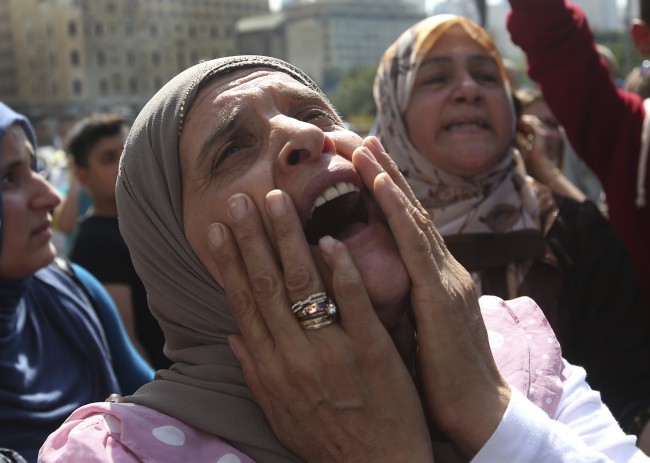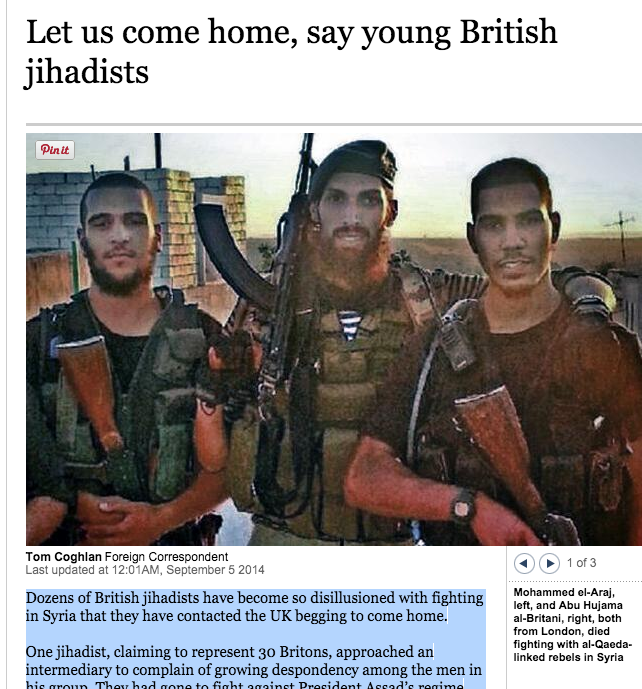Britain’s Jihadis Are Agents Of The British Government – Others Just Want To Come Home

The mother of a missing Lebanese soldier who was kidnapped by Islamic State militants, shouts slogans against the Lebanese cabinet during a demonstration to demand action to secure the captives’ release, in front the Lebanese government building, in downtown Beirut, Lebanon, on Thursday, Sept. 4, 2014. Lebanon’s government is forming a crisis committee to handle the case of some two dozen members of the security forces held captive by Syrian militants amid escalating criticism over its response to the hostage affair.
THE Times says: “Dozens of British jihadists have become so disillusioned with fighting in Syria that they have contacted the UK begging to come home.”
Begging to come home. Really?
One jihadist, claiming to represent 30 Britons, approached an intermediary to complain of growing despondency among the men in his group. They had gone to fight against President Assad’s regime but were instead engaged primarily in fierce combat with rival rebel groups, he said. The man, who cannot be named, contacted researchers from the International Centre for Study of Radicalisation and Political Violence (ICSR) at King’s College London via social media in the past two weeks. He effectively sought amnesty, saying that the group feared long prison terms but would be willing to enrol on a deradicalisation programme and submit to surveillance.
And be willing, surely, to grass up his former comrades.
Is this true? Or is it a spot of cunning, an attempt to make the jihadis distrust the BRitish contingent?
What is the International Centre for Study of Radicalisation and Political Violence?
ICSR’s mission is to bring together knowledge and leadership. Producing first class, rigorous research, our aim is to educate the public and help policymakers and practitioners find more intelligent solutions in dealing with radicalisation and political violence.
Shiraz Maher is a Senior Research Fellow:
Shiraz Maher is a Senior Research Fellow and is currently coordinating the Centre’s research on the Syrian and Iraqi conflicts. He also researches the development of Salafi-Jihadi ideology, and jihadist organisations in the broader Middle East. As a result of this research he has been invited to give evidence before three parliamentary committees.
Maher is also an adjunct at Johns Hopkins University where he teaches a course on radicalisation (along with Peter Neumann), and was a visiting lecturer at Washington College during the Spring Semester of 2012.
He was also awarded the first Konrad Adenauer Foundation Fellowship in Energy Security (2012-2013) based at the European Centre for Energy and Resource Security (EUCERS) where he explored the impact of political unrest in the Middle East on energy markets.
Maher has previously worked for Policy Exchange, writing on Security and Foreign Policy. He published a series of influential studies there which attracted widespread attention across government. His report on reforming the government’s counter-terrorism strategy was described by Michael Gove, Secretary of State for Education, as ‘brilliant’, while Lord Guthrie of Craigiebank, former Chief of the Defence Staff, called it ‘remarkable’.
But lest you think the outfit takes a side, it states:
ICSR is independent and non-partisan. All our work is published. We undertake no classified research for governments or international organisations.
The Times adds:
The militants are from a group affiliated with Islamic State, the terrorist network that beheaded two American journalists and is threatening to murder the British aid worker David Haines… More than 500 British citizens are believed to have travelled to the region since 2011, with most joining Isis, raising fears that they will return radicalised and trained to carry out terrorist attacks in the UK.
The British man told researchers: “We came to fight the regime and instead we are involved in gang warfare. It’s not what we came for but if we go back [to Britain] we will go to jail.
“Right now we are being forced to fight — what option do we have?”
Soldier discovers life in the military not all he thought it’d be. Shocker!
Shiraz Maher, who runs a research unit at ICSR that is in intermittent contact with about 50 British jihadists, said that the man regretted being involved in the conflict. The man said that he was among a group of fighters, most of them in their early twenties, “a good chunk of whom” were depressed and disillusioned, Mr Maher added.
One other thing that stands out in Tom Coghlans’ report is the lead image:

The man in the middle is Dutch. He goes under the name Yilmaz and likes M&Ms.
Posted: 5th, September 2014 | In: Reviews Comment (1) | TrackBack | Permalink


